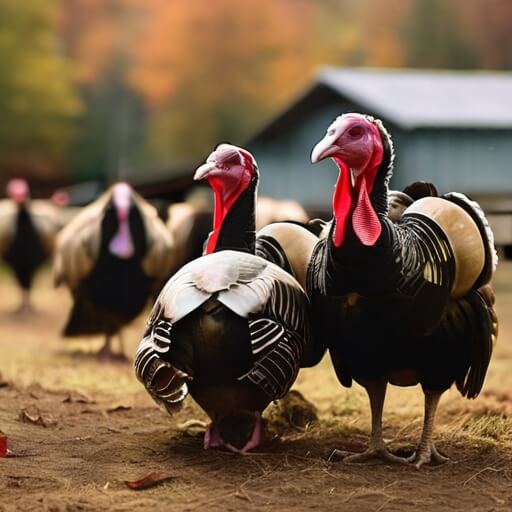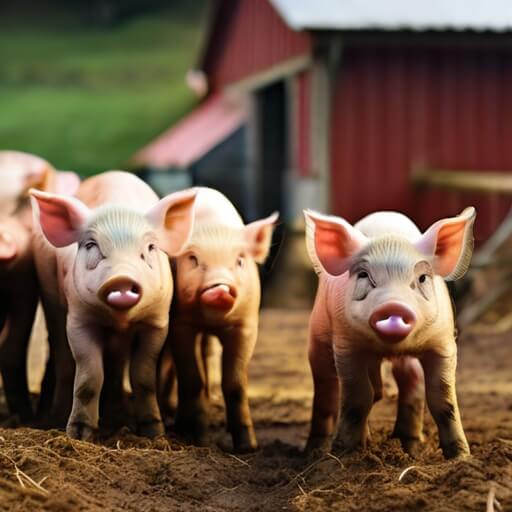How to Raise Chickens on an Off-Grid Farm
Table of Contents:
- Choosing the Right Chicken Breed
- Building a Chicken Coop
- Chicken Nutrition and Feeding
- Chicken Health and Care
- Egg Production and Management
- Meat Production
- Challenges and Solutions
- Conclusion
- FAQs
Raising chickens on an off-grid homestead offers a rewarding and sustainable way to increase self-sufficiency. These versatile birds provide a steady supply of fresh eggs, a source of meat, and even natural pest control. Beyond their practical benefits, chickens can also contribute to a thriving and balanced ecosystem on your property.
By carefully considering factors such as breed selection, housing, nutrition, and care, you can successfully integrate chickens into your off-grid lifestyle. This guide will provide essential information and practical tips to help you embark on your chicken-raising journey.
Let’s explore the world of backyard poultry and discover the joys and challenges of raising chickens on your off-grid homestead.
Choosing the Right Chicken Breed
Selecting the appropriate chicken breed is a crucial first step in your off-grid poultry adventure. Consider various factors to ensure your chosen birds thrive in your specific environment and meet your expectations.
Understanding Your Goals
- Egg Production: If eggs are your primary focus, opt for breeds known for their laying abilities.
- Meat Production: Consider breeds with faster growth rates and larger body sizes for meat purposes.
- Dual-Purpose: Some breeds excel in both egg laying and meat production.
- Ornamental Purposes: If you simply enjoy the beauty of chickens, choose breeds with striking plumage.
Factors to Consider
- Climate: Select breeds that are well-suited to your region’s climate. Some breeds are better adapted to cold or hot weather conditions.
- Space Availability: Consider the size of your chicken coop and run when choosing breeds. Larger breeds may require more space.
- Foraging Ability: If your chickens will have access to a pasture, choose breeds known for their foraging skills.
- Broodiness: Determine if you want hens that go broody (sit on eggs to hatch chicks) or non-broody breeds.
- Temperament: Consider the temperament of the breed, especially if you have children or other animals.
Popular Chicken Breeds
- Egg Layers: Leghorns, Rhode Island Reds, Australorps, and Plymouth Rocks are known for their egg-laying abilities.
- Meat Birds: Cornish Cross, Broilers, and Brahma are popular choices for meat production.
- Dual-Purpose Breeds: Orpingtons, Sussex, and Wyandottes excel in both egg laying and meat production.
- Heritage Breeds: Consider preserving genetic diversity by raising heritage breeds.
Research and Information
- Breed Standards: Familiarize yourself with breed characteristics and standards.
- Online Resources: Utilize online forums and communities to gather information and experiences from other chicken owners.
- Local Breeders: Connect with local breeders to learn about breeds well-suited to your region.
Building a Chicken Coop
A well-designed chicken coop is essential for the health and productivity of your flock. It provides shelter, protection, and a safe environment for your chickens to lay eggs.
Coop Design Considerations
- Size: Determine the appropriate size based on the number of chickens you plan to raise.
- Ventilation: Ensure proper airflow to maintain air quality and prevent moisture buildup.
- Predator Protection: Implement strong and secure measures to protect your chickens from predators.
- Nest Boxes: Provide sufficient nest boxes for egg-laying hens.
- Roosts: Offer comfortable roosting perches for your chickens to rest.
- Cleaning and Maintenance: Design the coop for easy cleaning and sanitation.
Materials and Construction
- Wood: A common choice for coop construction, offering insulation and aesthetic appeal.
- Metal: Durable and long-lasting, but can be more expensive.
- Recycled Materials: Explore using repurposed materials for a sustainable and cost-effective coop.
- Foundation: Consider a raised foundation to protect against dampness and predators.
Coop Layout
- Separate Areas: Divide the coop into sleeping, nesting, and outdoor areas.
- Run: Provide a secure outdoor area for chickens to exercise and forage.
- Shade: Offer shade during hot weather to protect chickens from heat stress.
Additional Features
- Water and Feeders: Provide clean water and feed within the coop or in a protected area.
- Automatic Doors: Consider using an automatic door for added convenience and security.
- Nest Box Liners: Use pine shavings or other soft materials for comfortable nesting.
Chicken Nutrition and Feeding
Proper nutrition is essential for healthy and productive chickens. Understanding their dietary needs and providing a balanced diet is crucial for optimal egg production, meat quality, and overall flock health.
Nutritional Requirements of Chickens
Chickens require a balanced diet consisting of:
- Protein: For growth, feather development, and egg production.
- Carbohydrates: Provide energy for daily activities.
- Fats: Essential for vitamin absorption and energy storage.
- Vitamins and Minerals: Support overall health and egg production.
- Water: Essential for digestion, circulation, and temperature regulation.
Commercial Chicken Feed
Commercial chicken feed is formulated to meet the specific nutritional needs of different chicken stages:
- Starter Feed: High in protein for chicks.
- Grower Feed: For young chickens transitioning to adulthood.
- Layer Feed: Formulated for egg-laying hens.
- Broiler Feed: Designed for rapid growth in meat birds.
Supplemental Feeding
To enhance your chickens’ diet, consider providing additional food sources:
- Scratch Grains: Offer a variety of grains like corn, wheat, and oats as a treat.
- Kitchen Scraps: Provide suitable vegetable scraps, but avoid excessive amounts.
- Green Forage: Allow chickens to graze on grass and weeds for additional nutrients.
- Supplements: Offer grit for digestion and oyster shells for calcium.
Water Supply
Ensure constant access to clean, fresh water. Provide water in suitable containers and clean them regularly.
Feeding Practices
- Free-Choice Feeding: Allow chickens to eat as much as they want, commonly used for layer hens.
- Limited Feeding: Control feed intake, often used for meat birds.
- Feed Storage: Store feed in a cool, dry place to maintain quality.
Chicken Health and Care
Maintaining the health and well-being of your chickens is essential for a thriving flock. Regular care, preventive measures, and quick responses to health issues will ensure the longevity and productivity of your birds.
Common Chicken Ailments
Understanding common chicken ailments can help you identify problems early and implement appropriate treatments.
- Respiratory Issues: Symptoms include coughing, sneezing, and difficulty breathing.
- Digestive Problems: Diarrhea, loss of appetite, and weight loss can indicate digestive issues.
- Parasites: Chickens can be affected by external parasites like mites and lice, as well as internal parasites like worms.
- Egg-Laying Problems: Issues such as egg binding or prolapse can occur.
Preventive Care
Regular inspections and preventative measures are crucial for maintaining a healthy flock.
- Routine Check-Ups: Examine your chickens daily for signs of illness or injury.
- Vaccination: Consult with a veterinarian to determine appropriate vaccinations.
- Cleanliness: Maintain a clean and sanitized coop to prevent disease outbreaks.
- Nutrition: Provide a balanced diet to support overall health.
- Predator Protection: Protect your chickens from predators to reduce stress.
Treating Sick Chickens
If you suspect a chicken is ill, isolate it from the flock to prevent the spread of disease.
- Home Remedies: For minor ailments, consider natural remedies like apple cider vinegar or garlic supplements.
- Veterinary Care: Seek professional help for serious illnesses or if home remedies are ineffective.
- Medication: Administer prescribed medications as directed by a veterinarian.
Biosecurity
Implementing biosecurity measures helps protect your flock from diseases.
- Quarantine New Birds: Isolate new birds for a period to monitor their health.
- Visitor Restrictions: Limit access to the coop to prevent disease transmission.
- Disinfection: Regularly clean and disinfect equipment and surfaces.
- Rodent Control: Prevent rodents from accessing the coop.
Egg Production and Management
Egg production is a primary reason many people choose to raise chickens. Proper management and care are essential for maximizing egg yield and maintaining flock health.
Factors Affecting Egg Production
Several factors influence egg production:
- Breed: Some chicken breeds are known for their exceptional egg-laying abilities.
- Age: Egg production peaks between the ages of 18 and 24 months and gradually declines.
- Nutrition: A balanced diet rich in calcium and protein is crucial for consistent egg laying.
- Lighting: Adequate light stimulates egg production, especially during shorter days.
- Health and Stress: Healthy chickens with minimal stress produce more eggs.
Egg Collection and Storage
- Regular Collection: Collect eggs daily to maintain egg quality and prevent breakage.
- Cleaning: Gently clean eggs with a damp cloth, avoiding the use of water.
- Storage: Store eggs in a cool, dry place with the pointed end down.
- Egg Washing: Wash eggs only if necessary and store them refrigerated.
Egg Quality
- Shell Strength: Ensure proper nutrition and calcium intake for strong shells.
- Egg Size: Egg size can vary depending on breed and age.
- Egg Color: Egg color is determined by the chicken’s breed and has no impact on taste or nutrition.
- Egg Storage: Proper storage prolongs egg freshness.
Egg Marketing
If you plan to sell eggs, consider the following:
- Local Markets: Explore farmers markets, farm stores, and community-supported agriculture (CSA) programs.
- Direct Sales: Sell eggs directly to customers through online platforms or home delivery.
- Regulations: Understand local food safety and labeling regulations.
Meat Production
While many people raise chickens primarily for egg production, others opt to raise them for meat. Whether you plan to process your own chickens or sell them, careful planning and execution are essential.
Choosing the Right Breed
- Broiler Breeds: Focus on breeds specifically developed for meat production, such as Cornish Cross or Plymouth Rock.
- Dual-Purpose Breeds: Some breeds can be raised for both meat and eggs, but their growth rates may be slower.
- Growth Rate: Consider the desired slaughter weight and timeframe when selecting a breed.
Broiler Housing and Feeding
- Separate Housing: Broilers often require separate housing due to their rapid growth and different nutritional needs.
- Nutrition: Provide a high-protein feed formulated for broiler chickens to support rapid growth.
- Space: Ensure adequate space for each bird to prevent overcrowding and stress.
- Litter Management: Maintain a clean and dry environment to prevent disease.
Processing Your Chickens
- Humanely Handling: Prioritize the humane treatment of chickens during the processing process.
- Slaughter Methods: Research and comply with local regulations for humane slaughter.
- Scalding and Plucking: Remove feathers efficiently through scalding and plucking.
- Evisceration: Remove internal organs and prepare the carcass for consumption or storage.
- Food Safety: Adhere to strict hygiene and food safety practices.
Selling Chicken Meat
- Local Markets: Explore farmers markets, farm stores, or community-supported agriculture (CSA) programs.
- Direct Sales: Sell whole chickens or processed cuts directly to consumers.
- Regulations: Understand local food safety and labeling regulations.
Challenges and Solutions
Raising chickens on an off-grid farm comes with unique challenges. However, with careful planning and problem-solving, you can overcome these obstacles and enjoy the rewards of self-sufficiency.
Common Challenges
- Predator Control: Protecting chickens from predators like foxes, hawks, and raccoons is essential.
- Disease Prevention: Maintaining a healthy flock requires vigilance and preventative measures.
- Egg Production Fluctuations: Egg production can vary seasonally and with age.
- Winter Care: Ensuring chickens’ comfort and survival during harsh weather.
- Limited Resources: Access to veterinary care and supplies might be restricted.
Solutions and Strategies
- Predator Protection: Implement fencing, netting, or predator deterrents. Consider guardian animals like dogs or llamas.
- Disease Prevention: Maintain a clean coop, practice good biosecurity, and monitor for signs of illness.
- Egg Production Management: Provide adequate lighting, nutrition, and space to optimize egg laying.
- Winter Care: Offer additional insulation, heat sources, and supplemental feed during cold weather.
- Alternative Resources: Explore natural remedies and herbal supplements for chicken health.
Conclusion
Raising chickens on your off-grid homestead offers numerous benefits, from fresh eggs to natural pest control. By carefully considering factors such as breed selection, housing, nutrition, and health, you can create a thriving and productive flock.
Remember that building a successful chicken-raising operation takes time, patience, and dedication. By observing your chickens, making necessary adjustments, and learning from your experiences, you can enjoy the rewards of self-sufficiency and the satisfaction of caring for these fascinating creatures.
FAQ: Raising Chickens on an Off-Grid Farm
1. What are the benefits of raising chickens on an off-grid farm?
Chickens provide fresh eggs, meat, and natural pest control, contributing to a self-sufficient lifestyle.
2. Which chicken breeds are best for off-grid farming?
Choose breeds based on your goals: Leghorns for eggs, Cornish Cross for meat, and Orpingtons for dual-purpose.
3. What type of shelter do chickens need?
Chickens need a well-ventilated, predator-proof coop with nesting boxes and roosting perches.
4. How much space do chickens require?
Each chicken needs 2-3 square feet inside the coop and 8-10 square feet in the outdoor run.
5. What should I feed my chickens?
Provide a balanced diet of commercial feed, kitchen scraps, and access to fresh water. Supplements like grit and oyster shells are also beneficial.
6. How do I ensure my chickens stay healthy?
Maintain a clean coop, provide a balanced diet, monitor for signs of illness, and practice biosecurity.
7. What are common chicken diseases and how can they be prevented?
Common diseases include respiratory infections and parasites. Prevent these with regular cleaning, vaccinations, and monitoring.
8. How do I manage egg production effectively?
Ensure proper nutrition, lighting, and health care to maximize egg production. Collect eggs daily and store them properly.
9. How can I use chickens for meat production?
Choose fast-growing breeds like Cornish Cross, provide high-protein feed, and follow humane processing practices.
10. What challenges might I face raising chickens off-grid?
Challenges include predator control, disease prevention, fluctuating egg production, and winter care.
11. How do I protect chickens from predators?
Use secure fencing, cover the run with netting, and consider guardian animals like dogs.
12. How do I care for chickens in winter?
Provide additional insulation, heat sources, and extra feed to maintain their health during cold weather.
13. How do I build a chicken coop sustainably?
Use materials like wood, metal, or recycled items, ensuring proper ventilation and predator protection.
14. What are the nutritional requirements of chickens?
Chickens need protein, carbohydrates, fats, vitamins, minerals, and constant access to clean water.
15. Can chickens forage for their food?
Yes, chickens can supplement their diet by foraging for insects and plants, which is beneficial for their health.
16. What are the best practices for egg storage?
Store eggs in a cool, dry place with the pointed end down. Clean only when necessary and refrigerate if needed.
17. How do I market chicken eggs and meat?
Sell at local markets, directly to consumers, or through community-supported agriculture (CSA) programs. Follow local regulations.
18. How do I handle broody hens?
Decide if you want hens to hatch chicks or prevent broodiness by removing eggs regularly and providing distractions.
19. What should I know about chicken behavior and social dynamics?
Chickens have a social hierarchy and need space to establish pecking order. Provide enrichment to prevent boredom and aggression.
20. How do I start raising chickens on an off-grid farm?
Begin by selecting the right breeds, building a suitable coop, providing proper nutrition, and preparing for health and environmental challenges.


